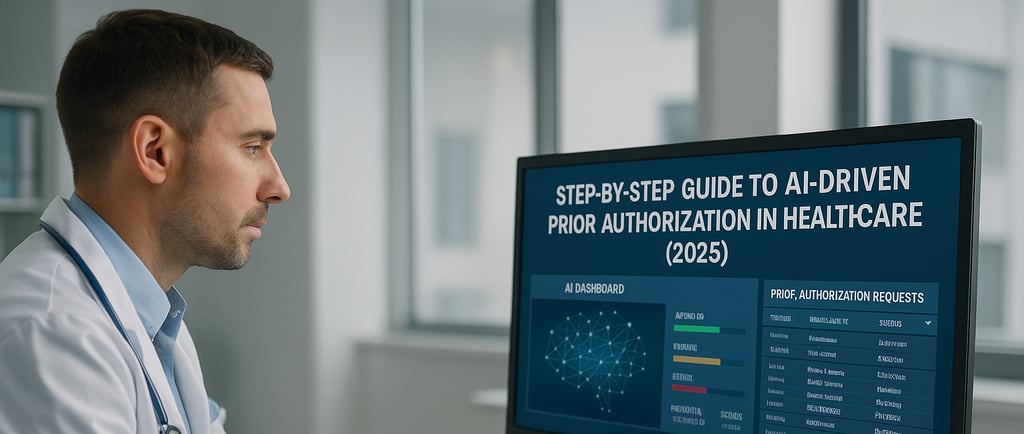Step-by-Step Guide to AI-Driven Prior Authorization in Healthcare (2025)
Explore how AI is transforming prior authorization in healthcare in 2025, enhancing efficiency while addressing ethical and regulatory challenges.
4/21/20252 min read


Introduction
In 2025, the healthcare industry stands at a crossroads. While artificial intelligence (AI) offers promising solutions to streamline prior authorization (PA) processes, concerns about patient safety, ethical considerations, and regulatory oversight have come to the forefront. Recent reports indicate that over 90% of physicians experience delays in patient care due to PA, with 29% noting serious adverse events as a consequence. American Medical Association
This guide delves into the current landscape of AI-driven prior authorization, providing a comprehensive overview of its benefits, challenges, and the steps necessary for responsible implementation.
What Is AI-Driven Prior Authorization?
AI-driven prior authorization leverages advanced technologies to automate and enhance the PA process. Key components include:
Natural Language Processing (NLP): Extracts relevant information from unstructured clinical documents.
Machine Learning (ML): Analyzes historical data to predict approval outcomes.
Robotic Process Automation (RPA): Automates repetitive tasks, reducing manual workload.
These technologies aim to reduce administrative burdens, accelerate decision-making, and improve patient outcomes.
Why Healthcare Needs AI in Prior Authorization
The traditional PA process is fraught with inefficiencies:
Administrative Burden: Physicians spend an average of 13 hours weekly on PA tasks, leading to burnout.
Patient Impact: Delays in PA can lead to treatment abandonment and adverse health outcomes. American Medical Association
Regulatory Pressures: New CMS rules emphasize interoperability and reduced administrative tasks, making AI integration timely. Informa TechTarget
Step-by-Step Process of AI-Powered Prior Authorization
Data Intake and Eligibility Check:
AI systems collect patient data and verify insurance eligibility.
Document Extraction and Verification:
NLP and OCR technologies extract necessary information from clinical documents.
Decision Support and Rule Mapping:
ML algorithms assess requests against payer guidelines to predict approval likelihood.
Automated Submission and Follow-Ups:
AI submits requests and monitors for responses, sending reminders as needed.
Status Tracking and Response Analysis:
Real-time tracking of request status with AI analyzing payer responses for next steps.
Appeals Handling:
AI assists in drafting appeal letters and resubmitting denied requests.
Choosing the Right AI Solution for Your Organization
When selecting an AI solution for PA, consider:
Integration Capabilities: Ensure compatibility with existing Electronic Health Records (EHR) and Revenue Cycle Management (RCM) systems.
Compliance and Security: Verify that the AI solution adheres to HIPAA and other regulatory standards.
Vendor Support: Assess the level of training and support provided by the AI vendor.
Scalability: Choose solutions that can grow with your organization's needs.
Challenges and Considerations Before Implementing AI
While AI offers numerous benefits, challenges persist:
Data Quality: AI effectiveness depends on the quality of input data; inaccurate data can lead to errors.
Bias and Fairness: AI systems must be regularly audited to prevent biases that could affect patient care.
Human Oversight: Despite automation, human review remains essential to ensure clinical appropriateness.
Cost: Initial investment can be significant; however, long-term savings and efficiency gains often justify the expense.
Real-World Case Studies: Success with AI Prior Authorization
Cohere Health: Implemented AI to auto-approve up to 90% of prior authorization requests, significantly reducing turnaround times.
WPS Health Solutions: Achieved a 30.27% reduction in processing time for prior authorizations by integrating AI solutions. Informa TechTarget
Future of AI in Prior Authorization and RCM
The future of AI in PA includes:
Predictive Analytics: AI will increasingly predict patient needs, allowing for proactive care management.
Enhanced Interoperability: Development of FHIR-based APIs will improve data exchange between providers and payers.
Regulatory Evolution: Expect stricter guidelines to ensure AI transparency and accountability in healthcare decisions.
Conclusion
AI-driven prior authorization is revolutionizing healthcare by reducing administrative burdens, accelerating decision-making, and improving patient outcomes. While challenges exist, the benefits of integrating AI into the PA process are substantial. Healthcare organizations should consider adopting AI solutions to stay ahead in an increasingly digital healthcare landscape.
